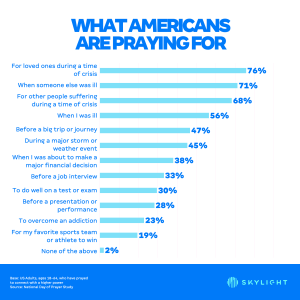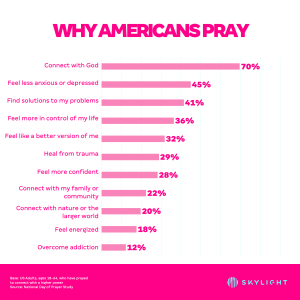-
 play_arrow
play_arrow
OchriO Streaming Live 24/7/365
-
 play_arrow
play_arrow
OchriO Live Stream
-
 play_arrow
play_arrow
London Calling Podcast Yana Bolder


Today is the National Day of Prayer. The first Thursday in May has been celebrated as the National Day of Prayer since 1988, when President Ronald Reagan designated that day. However, the tradition of a national call to prayer dates to colonial times. It is customary for the President to issue a proclamation each year recognizing the National Day of Prayer. Consistent with the history of the United States and its constitutional guarantees of freedom of religion, the National Day of Prayer is not limited to any particular faith.
- So what is prayer?
- How many people in the United States actually pray on a regular basis?
- What sort of things do they pray about?
- Why do they pray?
Because I am a Christian pastor and write from the Christian perspective, after addressing these subjects, I’ll conclude with a consideration of what the Bible says about prayer.
1. What is Prayer?
According to www.dictionary.com, prayer is “(1) A devout petition to God or an object or worship. (2) A spiritual communion with God or an object of worship, as in supplication, thanksgiving, adoration, or confession.”
From the Christian perspective, prayer is communication with God. Because it is “communication,” it should involve both speaking and listening. Many examples of prayer in Scripture involve both speaking to and hearing from God. Cite to my article from May 1.
2. How many people engage in prayer?
A recent survey commissioned by Skylight during April 2023 found that 61 percent of Americans reported that they pray. 12-61-percent-americans-pray-SL
(More information relating to this survey is available at https://prayerwrap.skylight.org/) If we use the 2021 U.S. population figure of approximately 332 million, that means just over 200 million people acknowledge that they pray. But what does that mean?
How much do people pray? According to the Skylight survey, the average amount of prayer per day among those who said that they pray was 18 minutes. 07-average-prayer-SL Now, lest we think that this statistic is skewed because it involves people of all faiths, the Pew Research Center survey in 2014 found that only 68% of Christians pray daily (https://www.pewresearch.org/religion/religious-landscape-study/christians/christian/frequency-of-prayer/).
3. What do they pray about?
Interestingly, the top three subjects that people pray for all relate to other people, not themselves. 18-what-americans-pray-for-SL 76% pray for loved ones in crisis; 71% pray for someone else who is ill; and 68% pray for others who are in crisis situations.

This graphic gives further detail about what people pray about. The percentages of people who pray about things for themselves are interesting for several reasons. First, the percentages decline with the perceived severity of the event which prompted the prayer. For example, 56% prayed “when I was ill,” while only 30% prayed “to do well on a test or exam.” (I exclude the prayer “to overcome an addiction” from this assessment. Obviously, addictions are very serious; however, I assume the lower percentage is the result of fewer people who have addictions praying regularly.)
4. Why do people pray?
The next graphic lists reasons why people pray, rather than what they pray about. 
The number one reason people pray is to “connect with God” (70%), which is consistent with a “traditional” view of prayer. Interestingly, the fourth most popular response was “feel more in control of my life” (36%), which seems to me to contradict the whole idea of prayer. If prayer is “a devout petition to God or an object of worship,” that would imply seeking help from someone greater than oneself (a “higher power”). If we need help from a higher power, how does that make us more in control?
I would suggest that this slide really shows the diversity of prayer and belief in our country. Several of these responses reflect what most people would consider “traditional” views of prayer:
- Connect with God
- Find solutions to my problems
- Heal from trauma
- Connect with my family or community
- Overcome addiction
Most traditional religious views of prayer would acknowledge all of these as “good” reasons to pray. The other responses, however, demonstrate a more self-oriented view of prayer. These responses show that people pray to feel:
- Less anxious or depressed
- More in control of my life
- Like a better version of me
- More confident
- More connected with nature or the larger world
- Energized
The common element in all of these is the word “feel.” Rather than seeking direction and help from a higher power, these pray-ers are motivated by how prayer makes them feel about themselves.
Now, there’s nothing wrong with feeling better when we pray; but is that really a proper motivation for our prayers? And is it consistent with the previous data which indicated that the top three things that people pray for are all related to other people?
5. What does the Bible say about prayer?
All of this brings me to the Bible, and what the Bible says about prayer. Now, there’s clearly no way that I can present a comprehensive view of what the Bible says about prayer in one article. However, Scripture teaches some basic principles about prayer – principles which help to explain the Christian view of prayer.
Jesus Expects that We Will Pray
First, Jesus clearly anticipates that his followers will pray. In fact, the most famous prayer in Scripture is the one he taught his disciples – the Lord’s Prayer. We find this prayer in Matthew 6:9-13 (a shorter version is found in Luke 11:2-4): “Pray, then, in this way: Our Father, who is in heaven, hallowed be Your name. Your kingdom come, Your will be done, on earth as it is in heaven. Give us this day our daily bread. And forgive us our debts, as we also have forgiven our debtors. And do not lead us into temptation, but deliver us from evil.” (Matthew 6:9-13, NASB).
As noted, Jesus anticipates that his disciples will pray: Pray, then, in this way is an imperative statement. Prayer is not an option for disciples (even though our practice may indicate otherwise). He also expects that we will pray every day. We are to pray for our “daily bread,” for forgiveness, and for God’s direction and protection. Finally, and perhaps even more importantly, we are to pray each day for God’s will to be done so that His Kingdom will come in its fullness.
Jesus Wants Us to Understand that We’re Praying to Our Heavenly Father
Second, Jesus wants his followers to understand that they are not praying to an impersonal “power”; they are praying to their Heavenly Father. Later in the Sermon on the Mount, Jesus says, “So if you, despite being evil, know how to give good gifts to your children, how much more will your Father in heaven give good things to those who ask Him!” (Matthew 7:11, NASB).
Prayer Is an Ongoing Conversation with God
Third, the apostle Paul encourages us to view prayer as an ongoing conversation with God. In a list of short statements instructing believers how to live, he says: “Rejoice always, pray without ceasing, in everything give thanks; for this is the will of God for you in Christ Jesus” (1 Thessalonians 5:16-18, NASB). “Pray without ceasing” must mean something other than “talk non-stop,” because it would be impossible for us to do that (after all, we have to eat and sleep). Also, a call to “talk non-stop” would be directly in conflict with Jesus’ reminder to not “keep on babbling” when we pray (Matthew 6:7, NIV).
Prayer Is Our Ministry to Each Other
Finally, James calls us to pray for one another, not only for ourselves. “Is anyone among you suffering? Then he must pray. Is anyone cheerful? He is to sing praises. Is anyone among you sick? Then he must call for the elders of the church and they are to pray over him, anointing him with oil in the name of the Lord; and the prayer of faith will restore the one who is sick, and the Lord will raise him up, and if he has committed sins, they will be forgiven him. Therefore confess your sins to one another, and pray for one another so that you may be healed. A prayer of a righteous person, when it is brought about, can accomplish much” (James 5:13-16, NASB).
Conclusion:
So what does all of this tell us? First, that many people of various faiths believe in prayer. One interesting fact that emerged from the Skylight survey is that people prayed more during the COVID lockdowns than before – and they have continued to pray more since the lockdowns ended. During the lockdowns, 82% either prayed the same amount or more; 80% indicated that their spiritual connections either stayed the same or increased following the lockdowns.
Second, the primary reasons that people pray are not selfish; people are praying for others, not themselves. This indicates that most people who pray sense that the focus of true prayer is outward – toward God and others – rather than inward.
Third, for my Christian brothers and sisters, this survey is a wake-up call. We need to devote ourselves to prayer (“pray without ceasing”). Interceding for others is a privilege; God invites us to participate in His Kingdom work by praying for each other. Satan tries to convince us that prayer is a burden, just as he tries to convince us that other gifts from God are burdens (worship, reading Scripture, fellowship, just to name a few). Commitment to prayer will help us to recognize the gifts that God has given us – gifts that “do not lead us into temptation, but deliver us from evil.”
The prayer of a righteous person can accomplish much!
Written by: OchriO
Similar posts
Recent Comments
No comments to show.Featured post

Latest posts
Current show
Upcoming shows

Impulse Amandla!!!
Presented by Dj Ross
09:00 - 12:00
Effulgent Amandla!!!
Presented by Dj Ross
12:00 - 15:00
Unretouched Amandla!!!
Presented by Dj Ross
15:00 - 18:00
Stratagem Amandla!!!
Presented by Dj Ross
18:00 - 21:00
Kindle Amandla!!!
Presented by Dj Ross
21:00 - 00:00Chart












Post comments (0)